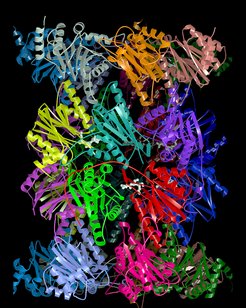Launch of Start-up QLi5 Therapeutics
Development of novel proteasome inhibitors for treating cancer, inflammatory and autoimmune disorders
The Lead Discovery Center GmbH (LDC) and the South Korean drug development specialist Qurient have founded QLi5 Therapeutics GmbH, together with the LDC’s partners, the Max Planck Society (MPG) and Nobel laureate Robert Huber, emeritus director of the Max Planck Institute for Biochemistry. Dortmund based QLi5 Therapeutics licensed novel proteasome inhibitors from LDC and its partners. QLi5 Therapeutics will advance these towards preclinical and clinical development for the treatment of cancers and inflammatory and autoimmune disorders.

The novel proteasome inhibitors were generated within a long standing and successful collaboration between the LDC and Robert Huber. Combining Huber’s vast expertise in the field of proteasome with the LDC’s drug discovery capabilities, the partners have created a portfolio of proteasome inhibitors with unique binding characteristics and favourable pharmacodynamic properties. The further development in the joint venture with Qurient is the outcome of a successful strategic partnership between Qurient, LDC and Max Planck.
“The proteasome is a real treasure chest,” Robert Huber comments, “and the launch of Qli5 Therapeutics enables us to harness its potential for the treatment of many diseases. Our new generation of proteasome inhibitors is set to overcome key challenges that have so far hampered a broader application of the first generation of covalently acting proteasome inhibitors.” The proteasome plays an important role in cell regulation by degrading proteins and represents a well established clinical target for the treatment of liquid tumours, in particular multiple myeloma.
“We believe the LDC’s innovative proteasome inhibitors hold exceptional potential, and we are excited to be part of QLi5 Therapeutics to jointly advance them towards preclinical and clinical testing,” Kiyean Nam, CEO and CSO of Qurient adds. “We very much appreciate the LDC as long-term partner and prime source of external innovation.” Over the last years, Qurient has licensed two other inhibitor projects from the LDC, targeting the kinases, Axl and CDK7 respectively. Both leads have made considerable progress since, e.g. nomination for clinical development.
“The foundation of Qli5 Therapeutics is the current peak of our trustful and long-term collaborations with Robert Huber and Qurient, our exceptionally strong and committed South Korean partner,” Bert Klebl, CEO and CSO of the LDC comments. “This joint venture is wonderful step forward in our mutual relationship and it is a great opportunity to translate the potential of the proteasome complex into more tangible benefits for patients.”
“Having previously licensed assets to Qurient, we are delighted to now jointly start-up a venture with Qurient. QLi5 provides excellent prospects to enable a much needed next generation of proteasome inhibitors. Bringing the company on track together with Qurient has been a swift and smooth endeavour, adds Dieter Link, Licensing manager at Max Planck Innovation GmbH.
